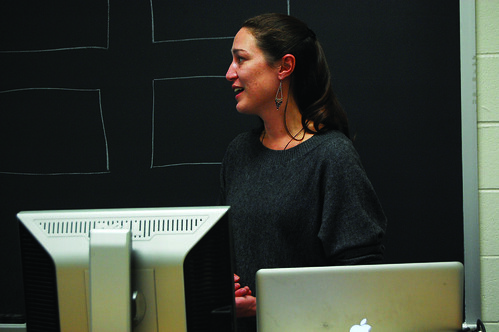Nathalie Applewhite shared her experiences abroad with students.

The approximate number of women who die each year from issues related to pregnancy and childbirth is 342,900, according to the Pulitzer Center on Crisis Reporting. Approximately 2.6 billion people in the developing world do not have access to functioning toilets. More than a billion people use unsafe water.
Issues surrounding these statistics are affecting large numbers of the world’s population and yet, they are largely ignored by the American media. Nathalie Applewhite, the managing director of the center and a Temple alumna, is trying to change that.
Applewhite returned to Temple as a guest speaker for the Mass Media and the Children class, taught by professor Renee Hobbs in Annenberg Hall. Applewhite spoke about the Pulitzer Center and how she obtained her dream job with the organization.
While at Temple, Applewhite was the university’s first undergraduate visual anthropology major, which focuses on ethnographic film and the way various groups are represented or represent themselves through the media.
“I chose visual anthropology because it allowed me to explore all of my interests,” Applewhite said.
Applewhite earned her undergraduate degree in seven years – she attended another university in New York City for a year, studied abroad in France prior to enrolling at Temple and transferred to Temple for four years.
While at Temple, she participated in the Latin American spring semester program and spent two semesters at Temple Japan.
Applewhite said while her frequent traveling may not have been the best choice economically, it helped her explore all of her interests and make some realizations about American news.
“It is easy to live in a bubble in this country,” Applewhite said. “I know a lot of people without passports or who have only ever left to go to Club Med.”
It was these observations that eventually led Applewhite to create the documentary, “Picture Me An Enemy.” The film tells the stories of two women from Bosnia and Croatia who point out the misrepresentation from American media portrayals of the conflicts in their native countries.
Applewhite and her partner, René Lego, created the film after the war in Bosnia ended without any money to use for the film’s production.
One of the women in the film, Tahija Vikalo, invited them to her home in Bosnia to do some filming.
“Amazingly, Tahija was open-hearted and open-minded and invited us to see Bosnia for ourselves,” Applewhite said. “We had no funding and no money. Vikalo’s family put us up for two months and we traveled around the country.”
Back in the United States, they worked on the project nights and weekends while they weren’t busy with their full-time jobs.
“People often asked me, ‘Why are you doing this?’” Applewhite said. “And I said, ‘I care!’”
“[More than] a quarter of a million people died. We are always oversimplifying the enemy, which makes them easier to kill,” Applewhite added. “I wanted to accurately reflect their story.”
“Picture Me An Enemy” took four years to create and was nominated for a Mid-Atlantic Emmy in 2003.
Applewhite went on to graduate with a degree in international affairs from Columbia University. While there, she participated in a citizen’s exchange program in Syria. She said her experience helped cultivate her awareness of the various problems in the U.S. news cycle.
“The demonization of how the United States represented Syria is ridiculous,” Applewhite said. “This is poor diplomatically because the Syrians see it, which makes them mad and more nationalistic. For a long time we were encouraging their silence because we weren’t asking for more representations from the media.”
She took a job at the Pulitzer Center in 2006 when the organization was only two-people strong.
“I was coming from an Ivy League, and the pay was low, but I didn’t see it that way,” Applewhite said. “It was a natural fit.”
The Pulitzer Center on Crisis Reporting draws from Applewhite’s interests of improving the quality of international reporting by offering grants to qualified journalists who seek to report untold stories.
“Our mission is to create hyper-global reporting, but it’s expensive,” Applewhite said. “The idea is that we address underreported systemic or underlying issues. These will never be the most-heard or most-tweeted stories. We always joke that if Google had a least popular story of the day button that is what we are looking for.”
“There aren’t enough people supplying international news because Americans have not been taught to care about the rest of the world,” Applewhite added. “We go out to schools and introduce issues. The idea is to energize kids to seek that info out.”
The Pulitzer Center’s focus on education helps to ensure there will always be plenty of consumers of news interested enough to read the stories people like Applewhite are trying to tell.
“I got lucky [getting my dream job] because I followed what I believe in,” Applewhite said.
Amy Stansbury can be reached at amy.stansbury@temple.edu.


Be the first to comment